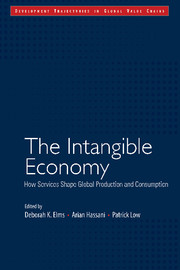Book contents
- Frontmatter
- Contents
- List of Figures, Tables and Boxes
- Acknowledgements
- 1 Introduction
- 2 Contextualizing Services in the World Economy
- 3 Services and Development: Priorities for Reform
- 4 Gainfully Linking into Global Value Chains: A Middle-Income Country's Perspective
- 5 Who Governs Global Value Chains?
- 6 Supply Chain Finance
- 7 Services and Economic Integration in ASEAN
- 8 Indian IT Firms: The Push for Innovation
- 9 Leveraging Business Process Outsourcing for Growth
- 10 Services in Global Value Chains and the Impact of Policy
- Contributors
- Index
- Development Trajectories in Global Value Chains
4 - Gainfully Linking into Global Value Chains: A Middle-Income Country's Perspective
Published online by Cambridge University Press: 19 October 2018
- Frontmatter
- Contents
- List of Figures, Tables and Boxes
- Acknowledgements
- 1 Introduction
- 2 Contextualizing Services in the World Economy
- 3 Services and Development: Priorities for Reform
- 4 Gainfully Linking into Global Value Chains: A Middle-Income Country's Perspective
- 5 Who Governs Global Value Chains?
- 6 Supply Chain Finance
- 7 Services and Economic Integration in ASEAN
- 8 Indian IT Firms: The Push for Innovation
- 9 Leveraging Business Process Outsourcing for Growth
- 10 Services in Global Value Chains and the Impact of Policy
- Contributors
- Index
- Development Trajectories in Global Value Chains
Summary
Introduction
The post-war miracle of the East Asian economies has resurfaced in policy discussions, precipitated by observations that only a handful of middle-income countries (MICs) have attained developed country status, whilst a good number seem to be caught in a pit of relative economic stagnation – dubbed the ‘middle income trap’. A huge part of the East Asian story is ascribed to these economies’ cunning ability to use trade to promote domestic growth and overcome development hurdles. Drawing from this model, it may be inferred that those trapped in the middle-income zone have failed to exploit trade enough to allow them passage to a higher income level. There is no denying that the realities of the present global ecosystem and the development challenges they present are different from the 1980s. However, many still see the East Asian model relevant insofar as it offers an escape path that combines trade with the right mix of domestic policies.
What makes the present development challenges different from when the Asian MICs were transitioning to high-income status is the increasing dominance of GVCs. Production processes have been spread across countries for decades, but they were not as fragmented and dispersed as one finds them now. Simple and complex networks have developed around value chains at an unprecedented pace. Since these value chains cover the full range of activities, from conception to final use, specializations have developed among tasks rather than goods. That includes services, which are increasingly important as sources of value in GVCs.
It has become impractical to recreate the value chain domestically without considerable costs and loss of opportunities to the host economy. As a consequence, the East Asian economic transformation of gradual, yet systematic build-up of productive capacity – from light manufacturing to heavy and, eventually, knowledge-intensive industries – seems archaic in a nearly borderless production system where tasks or activities, rather than goods, are the objects of trade. Productive capacities are being built through participation in dynamic, complex and overlapping international business networks, created through a maze of foreign direct investments (FDIs) and global sourcing, which make linking into GVCs a development imperative.
- Type
- Chapter
- Information
- The Intangible EconomyHow Services Shape Global Production and Consumption, pp. 36 - 54Publisher: Cambridge University PressPrint publication year: 2017



